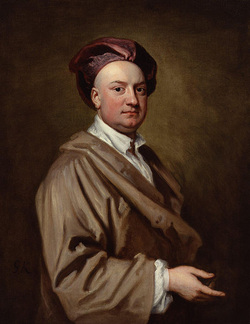PERSONAGES OF THE DUNCIAD
Richard Bentley (1662-1742)
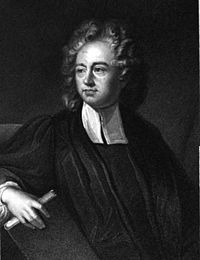
Scholar and clergyman. He was the greatest classical scholar of his time and was a ruthless teacher at Trinity College. As a champion of the Moderns he was at the heart of the debate between them and the Ancients. Although Pope underestimates the importance of Bentley's outstanding critical gifts we cannot deny that the critics aggressive temperament proved conducive to quarrels on many occasions. Bentley can be found in BOOK 2.8.
Sir Richard Blackmore (1650-1729)
A physician and poet. One of his more well known works is Prince Arthur (1695) which is mentioned in a Dunciad footnote. Blackmore and Pope were not close but were on good terms with one another for much of their careers. Blackmore in fact was a subscribing to Pope's Iliad. It was not until Blackmore took some jabs at Swift that were published by Curll that tension was aroused between them. Pope uses Blackmore as a representative of the general "loudness" of Dunce poetry. Blackmore appears in BOOK 1.4 and BOOK 2.10, 2.12.
Colley Cibber (1671-1757)
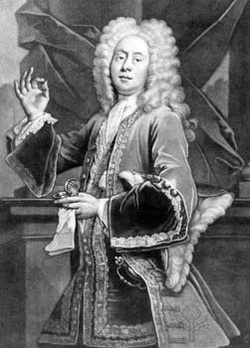
Colley Cibber was an actor, dramatist, theatrical manager, and actor. Cibber gained his renown from his popular renditions of Shakespearean plays that continued to be played late into the 19th century. As Poet Laureate Cibber replaced Theobald as the new King of the Dunces.
Cibber appears in BOOK 1.2, 1.5, 1.7, 1.10, BOOK 2.1
Cibber appears in BOOK 1.2, 1.5, 1.7, 1.10, BOOK 2.1
Mathew Concanen (1704-49)
Irish writer who joined William Warburton and Lewis Theobald in attacking Pope's Shakespeare edition. Renowned in the Dunciad for sinking lower than his peers in the mud diving contest. Concanen appears in BOOK 2.6, 2.10.
Edmund Curll (1683-1747)
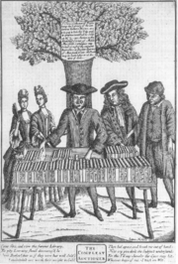
London bookseller based near Fleet Street and the Strand. Often engaged in scandalous publishing commitments and was arrested more than once. Curll infamous dealings with Pope include the publishing of the so-called Court Poems, a group of poems written between Pope, John Gay, and Mary Wortley Montagu that were not intended for the public. Just as Curll used Pope as a scandalous subject to sell his own publications so too did Pope distort and exaggerate the actions of Curll to add satiric edge to his own works. Curll appears in BOOK I.2 and BOOK 2.1, 2.3, 2.5, 2.7
John Dennis (1657-1734)
Poet, dramatist, and perhaps the first "professional" literary critic in the English language. As he advanced in his career he developed a tendency to quarrellel with his subjects and so developed difficult relations with figures including Addison, Steele, and Swift. Pope and Dennis had a mutual antagonism that lasted for years although they were reconciled near the end of Dennis' life. His interests in the sublime, manifested in figures like the Greek critic Longinus, make him an important figure in changing literary interests of his time. Dennis appears in BOOK 1.4 and BOOK 2.9
Lawrence Eusden (1688-1730)
Eliza Haywood (1693-1756)
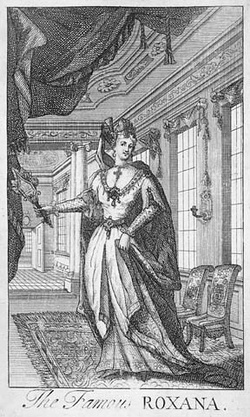
Author and actress. Especially known for her journal The Female Spectator and for her response to Richardson in Anti-Pamela. She earned her place in the Dunciad for mocking some of Pope's friends, recent scholarship has found that her portrayal as holder of the china piss pot is a bit more degrading of a punishment than her crimes deserved. Haywood appears in BOOK 1.4 and BOOK 2.7.
John Henley (1692-1756)
An ornate public preacher who is known to have been particularly irritated to have found himself in Pope's Dunciad. He appears in BOOK 1.7 and BOOK 2.1, 2.12, 2.13.
Barnaby Bernard Lintot (1675-1736)
Well known bookseller during Pope's time. Worked on Fleet Street near Temple Bar. Specialized in poetic anthologies, also published Pope's translations of Homer. Pope's mockery of Lintot in the Dunciad seems more for the fun of casting him against Lintot's publishing rival Curll rather than out of any personal malice. Lintot appears in BOOK 1.3, 1.4 and BOOK 2.3, 2.4.
Elkanah Settle (1648-1724)
Was the last of the City Poets (appointed 1691) before that post was abolished. In the Dunciad he figures as Virgil's Anchises from the Aeneid Book 6 in his role of foreseeing the coming victory of Dulness. Settle appears in BOOK 1.4, 1.5.
Lewis Theobald (1688-1744)
Pronouced "Tibbald," Theobald was an editor, poet, and dramatist. Worked for Bernard Lintot mainly as a translator from Greek. His trouble with Pope began when he started working with Curll. It was Theobald's publishing of his Shakespeare Restored which he intended to counter what he called Pope's faulty scholarship that earned him his place in the Dunciad. Theobald would be replaced in the 1728 Dunciad as King of the Dunces but still retains a marginal position in the poem. He appears in BOOK 1.5, 1.10.
Jacob Tonson (1655-1737)
